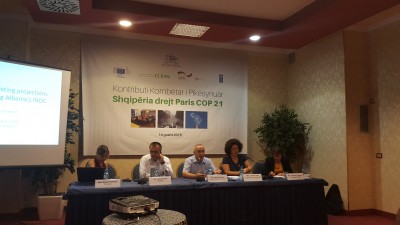
Albanian deep and
structural process of reform in the energy sector has seen lately an acceleration
pass also toward achieve the ultimate objective of the UNFCCC as set out in
Article 2 of the Convention. Intended Nationally Determined Contribution
following decision 1/CP.19 and decision 1/CP.20 of the United Nations Framework
Convention on Climate Change (UNFCCC) invited Parties to communicate the UNFCCC
Secretariat their INDCs.
Thus the INDC of
Albania will represent a baseline scenario target to the scenario period of 2015
or 2016 – 2030.
Indeed the Article 13
of the Energy Community Treaty sets out that “[t]he Parties recognise the
importance of the Kyoto Protocol. Each Contracting Party shall endeavour to
accede to it.” Although this does not constitute a legal obligation under
the Energy Community Treaty, there are certain steps occurring in the climate domain,
as confirmed by the European Commission’s progress reports, which are pertinent
to this report.
According to United
Nations Framework Convention on Climate Change (UNFCCC) data, all Contracting
Parties have ratified the Kyoto Protocol and all of these countries with the
exception of Serbia and Ukraine have done so via accession. However, there has
been no or very limited progress reported from Albania, Bosnia and Herzegovina,
Moldova, Montenegro, Kosovo and the institutional framework within these
Contracting Parties remains very weak.
Croatia has a stable
policy framework in place in the field of climate change and it participates
actively in the UNFCCC negotiations, regularly supporting the EU position.
Croatia participated actively in the climate work enacted under the Regional Environmental
Network for Accession (RENA). It continued to take steps towards compliance in
so far as the EU Monitoring Mechanism is concerned. Regarding emissions trading,
in October 2010 Croatia amended its implementing legislation on emission quotas
and the detailed procedures of trading emission units to further align with the
acquis.
In Former Yugoslav
Republic of Macedonia, the preparation of the Third National Communication on
Climate Change has started. The Roadmap for the introduction of monitoring,
reporting and verification of GHG emissions under the EU ETS has been drafted
with the support of the Republic of Bulgaria. The preparation of a sector
identification template for Environment and Climate Change is ongoing within
the framework of IPA 2012 – 2013. This will set the general legal base for the transposition
of the relevant aquis.
In Serbia, the Serbian
National Sustainable Development Strategy, adopted in 2008 and recently updated
along with the National Environmental Protection Programme adopted in 2010, identified
climate change as a key risk and put forward actions to mitigate and adapt to
it. The Energy Development Strategy also involves elements regarding climate
change mitigation measures up until 2015. Serbia is a non-Annex-1 Party to the
UNFCCC and has ratified the Kyoto Protocol.
The Government adopted
a national Clean Development Strategy in February 2010. Serbia submitted its first
national communication in November 2010, with greenhouse gas (GHG) inventories
for 1990 and 1998, plus projections for 2012 and 2015. The country has also
begun preparing its second national communication (to cover GHG emissions from
2000 to 2010). Serbia is currently assessing the financing needed for
mitigation, including the formulation of the necessary financial plans.
Nationally appropriate mitigation actions up to 2020 for the energy efficiency
sub-sector are being developed and should be completed by mid-2013.
Albania has ratified
both the United Nations Framework Convention on Climate Change (UNFCCC) and its
Kyoto Protocol with the status of a Non-Annex 1 Party. In the International
Climate Change talks Albania has associated with European Union positions and
within the restrictions of being a Non Annex I party committed to implement
‘National Appropriate Mitigation Actions’ – NAMAs.
Albania’s contribution
to the global greenhouse gas emissions is relatively low, estimated at an
average of 9,4 million ton/year of CO2 eqv. This is because over 95 percent of
Albania’s electricity is produced from hydro sources and high energy intensity
industries are no longer operating. This would also mean that Albania’s
greenhouse gas emissions allows to have a smooth trend of achieving 2 tons of
greenhouse gas emissions per capita by 2050, which can be taken as a target for
global contraction and convergence of greenhouse gas emissions.
|
Estimated GHG emission savings from the use |
2013 Year n-1 |
2012 Year n-2 |
|
Total estimated net GHG emission saving from |
6,788,309 |
5,240,989 |
|
– Estimated net GHG saving from the use of renewable electricity |
4,752,450 |
3,971,573 |
|
– Estimated net GHG saving from the use of renewable energy in heating |
1,736,065 |
1,504,745 |
|
– Estimated net GHG saving from the use of renewable energy in transport |
280,631 |
232,523 |
Transportation (mobile
sources) followed by agriculture and waste sector are the main categories that
are found to have significant contribution to the total greenhouse gas
emissions for Albania. The
contribution of renewable energy sources in the reduction of emissions of greenhouse
gases, has been made, so-called avoided CO2 emissions due to the use of renewable
energy instead of fossil fuels. The avoided emissions is determined in a manner
that the amount of electricity from renewable energy sources, the amount of
renewable energy for heating and cooling and renewable energy in the transport,
is replaced by fossil fuels and their respective CO2 emissions.
The
here
communication came within the framework of the international project on
Adapting to Climate Change, developed as a local partner by the ACERC. In cases
of interest to the directly cooperation as author with analyses or for any kind
of involvement or support as well as a partner, contact us at the
info@albaniaenergy.org. For more keep update with the EU & WBs / Albania Energy Regulation Updates or visit the Official
Page of ACERC.